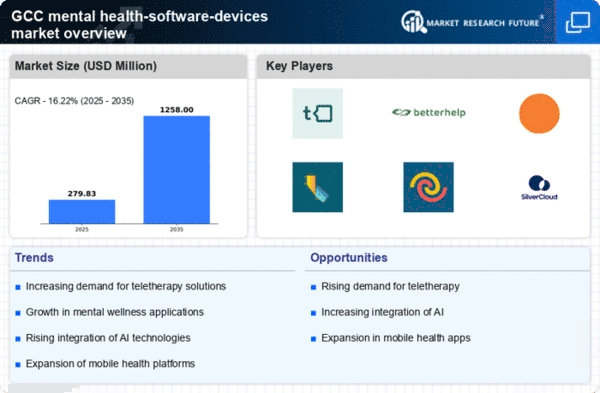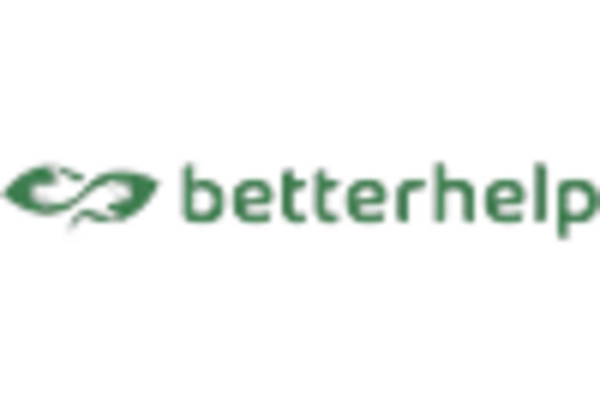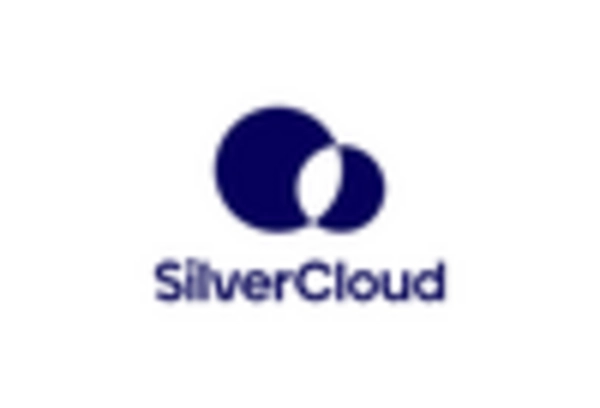Rising Mental Health Awareness
The increasing awareness surrounding mental health issues in the GCC region is a pivotal driver for the mental health-software-devices market. As societal stigma diminishes, more individuals are seeking help, leading to a surge in demand for mental health solutions. Reports indicate that approximately 30% of the population in GCC countries experience mental health challenges, which necessitates effective intervention tools. This growing recognition of mental health's importance is prompting both public and private sectors to invest in innovative software and devices. Consequently, the mental health-software-devices market is likely to expand as more users turn to technology for support, therapy, and self-management of their mental health conditions.
Government Initiatives and Funding
Government initiatives aimed at improving mental health services in the GCC are significantly influencing the mental health-software-devices market. Various governments are allocating substantial budgets to enhance mental health care, with some countries increasing funding by over 20% in recent years. These initiatives often include the development of digital platforms and mobile applications designed to provide accessible mental health resources. By fostering partnerships with tech companies, governments are facilitating the creation of innovative solutions that cater to the needs of their populations. This proactive approach not only enhances service delivery but also stimulates market growth as new products and services emerge in response to government mandates.
Increased Focus on Preventive Care
The shift towards preventive care in the GCC is emerging as a crucial driver for the mental health-software-devices market. With a growing emphasis on early intervention and wellness, individuals are increasingly utilizing technology to monitor their mental health proactively. This trend is reflected in the rising popularity of mental health apps that offer self-assessment tools and wellness tracking features. Market data suggests that the demand for preventive mental health solutions could increase by 25% over the next few years. As consumers become more health-conscious, the mental health-software-devices market is likely to expand, catering to the needs of those seeking to maintain their mental well-being.
Technological Advancements in Healthcare
Technological advancements are reshaping the landscape of the mental health-software-devices market. Innovations such as artificial intelligence, machine learning, and data analytics are being integrated into mental health applications, enhancing their effectiveness and user engagement. For instance, AI-driven chatbots are being utilized to provide immediate support and resources, which can lead to improved outcomes for users. The GCC region is witnessing a rapid adoption of these technologies, with a projected growth rate of 15% in the next five years. As healthcare providers increasingly embrace these advancements, the mental health-software-devices market is expected to flourish, offering more sophisticated and personalized solutions.
Integration of Mental Health into Primary Care
The integration of mental health services into primary care settings is a significant driver for the mental health-software-devices market. This approach facilitates a holistic view of health, allowing for the simultaneous treatment of physical and mental health issues. In the GCC, healthcare providers are increasingly recognizing the importance of addressing mental health within primary care, leading to the development of integrated software solutions. This trend is expected to enhance patient outcomes and streamline care delivery. As a result, the mental health-software-devices market is likely to see increased demand for tools that support this integrated care model, potentially growing by 18% in the coming years.

















